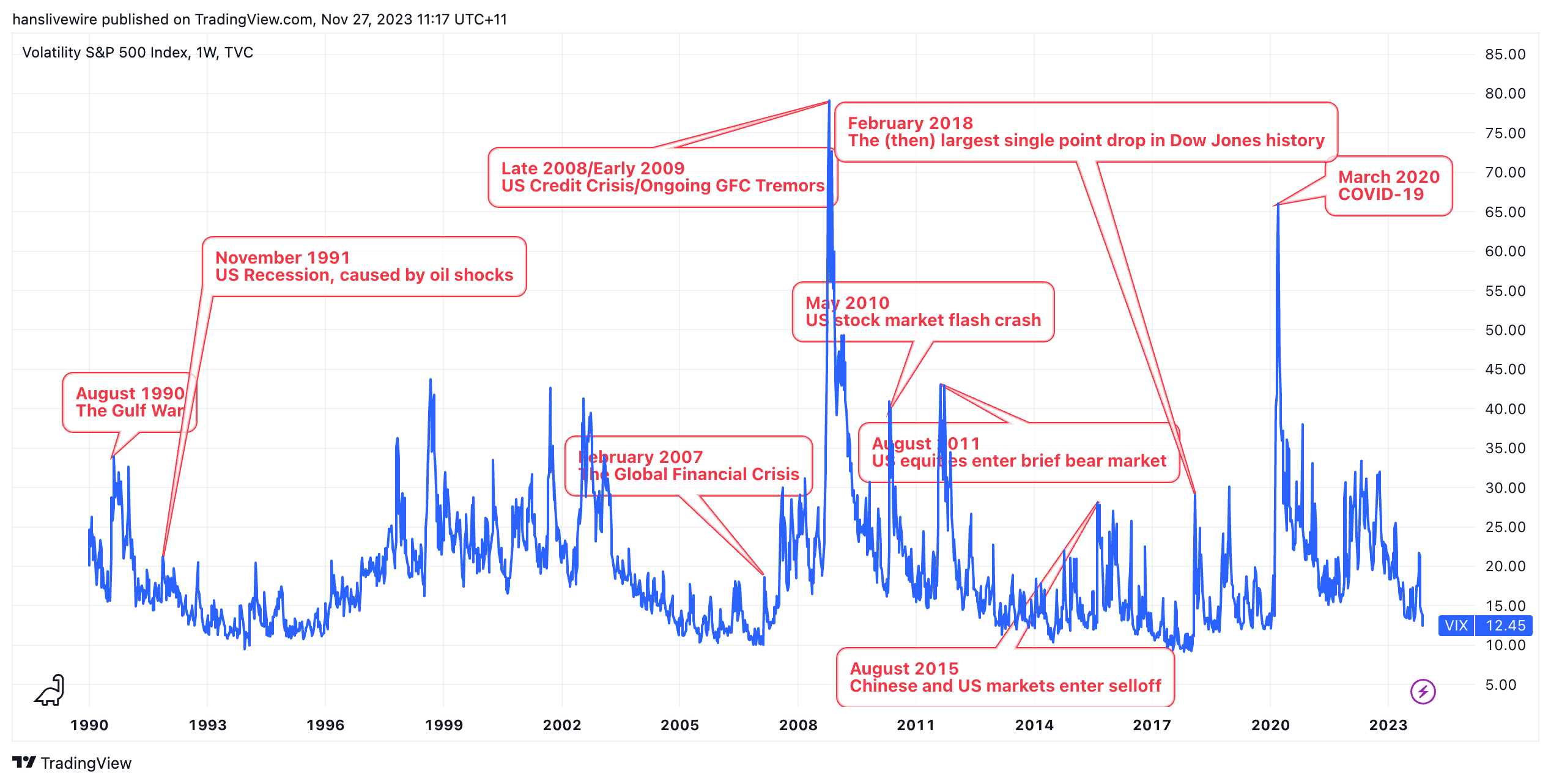The stock market's "fear gauge" is at pre-COVID lows. Should you be worried?
If equity market investors had a Venn diagram where technical aficionados live on one side and fundamental aficionados live on the other side, the middle portion could very well be sentiment.
After all, it's probably the most well-known of all the unpredictable factors that can turn on a dime. One bad earnings result from a bellwether company, one unexpected rate hike from a central bank, or even one thread on a social media trading forum can now alter market pricing in dramatic ways.
That's where knowing sentiment - and more specifically, the Volatility Index (or VIX), comes into play. This index measures S&P 500 index options. Put simply, the higher the index level, the choppier the trading environment is implied to be.
Using this logic, you can probably guess when the VIX was last incredibly high - COVID's outbreak in March 2020.

While there have been spikes along the way in the last three years, the trend has generally been down. This week, the VIX reading plummeted to levels we have not seen since before the COVID-19 pandemic.
So is this a "calm before the storm" moment or a great buying opportunity? We'll examine that question with the help of two experienced traders - Henry Jennings and Kai Chen.
A little history
ING Economics calculates there have been eight major spikes in the Volatility Index since its birth in 1990. A major spike is defined as one where the VIX reading jumped by more than 50% over two successive trading days. All were precipitated by major events or a breakdown of some form in financial markets. I have also added a ninth event that wasn't on ING's list - COVID-19 itself. All these events can be seen in the annotated chart below:

In every case (bar one, August 1990), stocks have crashed and bond prices have skyrocketed as a result of the higher VIX reading. In contrast, with the VIX at a near-four-year low, the S&P 500 is inches off its all-time high reached in November 2021.
This is why it really pays to know what's going on in the volatility index. It's not perfect but it is a good indicator of what can happen.
What other signals does a low VIX provide?
Complacency, according to Jennings, is one of the other signals of a low VIX.
"Given the risks still out there, the market is clearly not regarding them as significant. Ceasefires in Gaza and from the Federal Reserve are helping to ease fears," he said.
Chen mildly disagrees, arguing that the Fed is done with its rate-hiking policy and that the ensuing rally is what has really depressed the VIX. But while it sounds like a bull's argument, he does offer caution:
"While this scenario hints at a buying opportunity in stocks, investors should remain vigilant. Any unexpected upticks in inflation could reshape this landscape, indicating that this calm might be a precursor to more volatility," Chen said. "This isn't a blanket signal to buy equities," he added.
Is a low VIX a good opportunity to sell?
If you go by the logic ING has provided, a low VIX could be a good time to sell before whatever storm arrives. To quote the Oracle of Omaha, "Be greedy when others are fearful and fearful when others are greedy".
Jennings agrees.
"Given the US market has run hard and looks overbought especially in the Magnificent Seven, buying protection at cheap levels through options would be a good strategy," Jennings said.
Options are available through your regular online broker. You can buy put options (a bet that an asset's price will go down, thus limiting risk) or call options (a bet that an asset's price will go up, thus adding risk). Whatever option you buy, you must nominate an expiry date.
Or... is it a good opportunity to buy?
There is also a contrarian argument in all this. In this case, a low VIX may imply that this is an opportunity to start buying long-volatility options if you have access to those instruments.
"I would be buying volatility at these levels. It's the calm before the storm," Jennings argued.
Chen disagrees, arguing this sets us up for a Santa rally and then a more subdued start to 2024.
"The current low in VIX, coinciding with the S&P 500's recent 10% recovery over the last month, could see a continuing relief rally into the holiday season. Post-relief rally, we might see more subdued market movements," Chen said.
It should be said that the VIX has no direct impact on the Australian market nor can you buy the VIX from a regular broker here in Australia. But of course, massive moves in the US can have big influences on sentiment in the Australian market at an index level. Heading into 2024, Jennings says it's hard to get excited about the local market but he is looking for opportunities in some parts.
"We are picking up some bombed-out resources but it needs patience. We are also still looking at some healthcare stocks like CSL (ASX: CSL) and ResMed (ASX: RMD)," he said.
Chen, taking the comparatively bullish argument, looks to fixed income and uranium for ideas.
"We're bullish on the energy sector, particularly Uranium stocks, as they play a key role in the energy transition. Concurrently, we see fixed income still offering attractive yields. Our strategy balances bullishness in specific sectors with a cautious stance overall," Chen said.
Livewire contributor and Wheelhouse Partners MD Alastair MacLeod has written extensively on the subject. You can read more about it here:
.png)
3 topics
2 stocks mentioned
3 contributors mentioned

